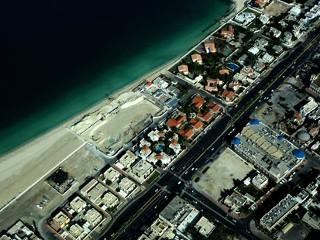By SUSANNE KOELBL
Brigadier General Mohammed Asif Jabarkhel sits with folded arms in his office, just a few steps away from the security checkpoint at Kabul International Airport. "Of course I know what's going on here," the 59-year-old head of the airport's customs police grumbles from beneath his thick moustache as a fan whirs in the background. "But, in this country, who's allowed to speak the truth?"

An aerial view shows villas and houses along the coast of the Gulf emirate of Dubai on December 17, 2009. A number of Afghan businesspeople have purchased expensive villas in Dubai, once only attractive as a golfer's paradise. These include a brother and a cousin of Afghan President Hamid Karzai, one of Karzai's former vice presidents and the brother of Mohammad Qasim Fahim, one of the country's two current vice presidents.(Photo: Marwan Naamani/AFP/Getty Images)
Jabarkhel is referring to the huge amounts of money regularly being secreted out of Afghanistan by plane in boxes and suitcases. According to some estimates, since 2007, at least $3 billion (¬2.4 billion) in cash has left the country in this way. The preferred destination for these funds is Dubai, the tax haven in the Persian Gulf. And, given the fact that Afghanistan's total GDP amounts to the equivalent of $13.5 billion, there is no way that the funds involved in this exodus are merely the proceeds of legal business transactions.
Jabarkhel complains that all of his many attempts to stop this hemorrhaging have failed. "The central bank has reached an agreement with the government that makes these kinds of transfers supposedly legal," he says. "And whenever we try to look into where the money is coming from, pressure comes from the very top."
Since invading Afghanistan in 2001, the United States alone has invested almost $300 billion in military and reconstruction efforts there. But far less progress has been made than what was either hoped for or expected. One major reason for this could be the fact that a significant portion of the millions meant for reconstructive efforts continue to be siphoned off. The people benefiting are often those who enjoy extremely close business ties with the donor countries.
It is clear that much more money is making its way out of Afghanistan through Kabul's airport than is being officially declared and logged. For example, important politicians and businesspeople can often board planes from the airport's special VIP area without being searched. And if customs officials do conduct a search and find a suitcase stuffed with millions of dollars in cash, people with powerful connections often step in to make sure that the luggage makes it out of the country with its owner -- no questions asked. "A couple phone calls are made," General Jabarkhel says with frustration in his voice, "and the person can carry on."
From Golf to Graft
Over the past nine years, Afghanistan has been a goldmine for quite a few adventurous businesspeople. The most successful of them are often related to members of the government, who give them unsurpassed access to the top decision-makers. And their financial transactions are, of course, far from transparent.
A number of Afghan businesspeople have purchased expensive villas in Dubai, once only attractive as a golfer's paradise. These include a brother and a cousin of Afghan President Hamid Karzai, one of Karzai's former vice presidents and the brother of Mohammad Qasim Fahim, one of the country's two current vice presidents. Asking prices for the stylish, Roman-style houses built along the beaches of the man-made island Palm Jumeirah, for example, start at $2 million. Until just a few years ago, many of their current inhabitants were far from wealthy.
As the Washington Post has discovered, these properties are often only registered under the names of the individuals issuing the loans, such as Sherkhan Farnood, the founder and chairman of Kabul Bank, Afghanistan's largest private bank, who was also a key supporter of President Karzai during his 2009 re-election campaign. Like many of his clients, Farnood now spends the majority of his time in Dubai. And among the 16 shareholders in his bank are Mahmoud Karzai, the president's business-minded older brother, and Haseen Fahim, the brother of Afghan Vice President Mohammad Qasim Fahim.
Most financial transactions in Afghanistan continue to be conducted through so-called "hawalas," traditional Islamic money-transferring outfits based more on honor and good faith than receipts, a fact that makes it more or less impossible for Western corruption investigators to trace the flow of money.
According to the Washington Post, Farnood also operates a Dubai-registered hawala in Kabul. Its chief audit officer says that it helped transfer hundreds of millions of dollars from Afghanistan to Dubai in 2009 . In any case, that would be significantly more than the $150 million that people borrowing [jw5] from Farnood's bank have officially invested in properties in Dubai.
Cutting Off the Money
In the summer of 2009, the amount of money leaving Afghanistan became a bit clearer when the international security company Global Strategies Group took over responsibility for providing security at Kabul's airport and began filing reports on the money transfers. For a while, the company reported frequently to Afghanistan's domestic intelligence service. But, according to the newspaper, the company quit filing these reports in September because it was apparently no longer desired by higher-ups.
Reports on cases of persistent corruption like this have enraged American politicians and led a key panel to approve a freeze on the $3.9 billion in aid for Afghanistan's government already earmarked for the 2011 budget year. Nita Lowey, the chairwoman of the foreign aid appropriations subcommittee [jw9] of the US House of Representatives, told her colleagues last Wednesday: "I do not intend to appropriate one more dime for assistance to Afghanistan until I have confidence that US taxpayer money is not being abused to line the pockets of corrupt Afghan government officials, drug lords and terrorists."
Translated from the German by Josh Ward



